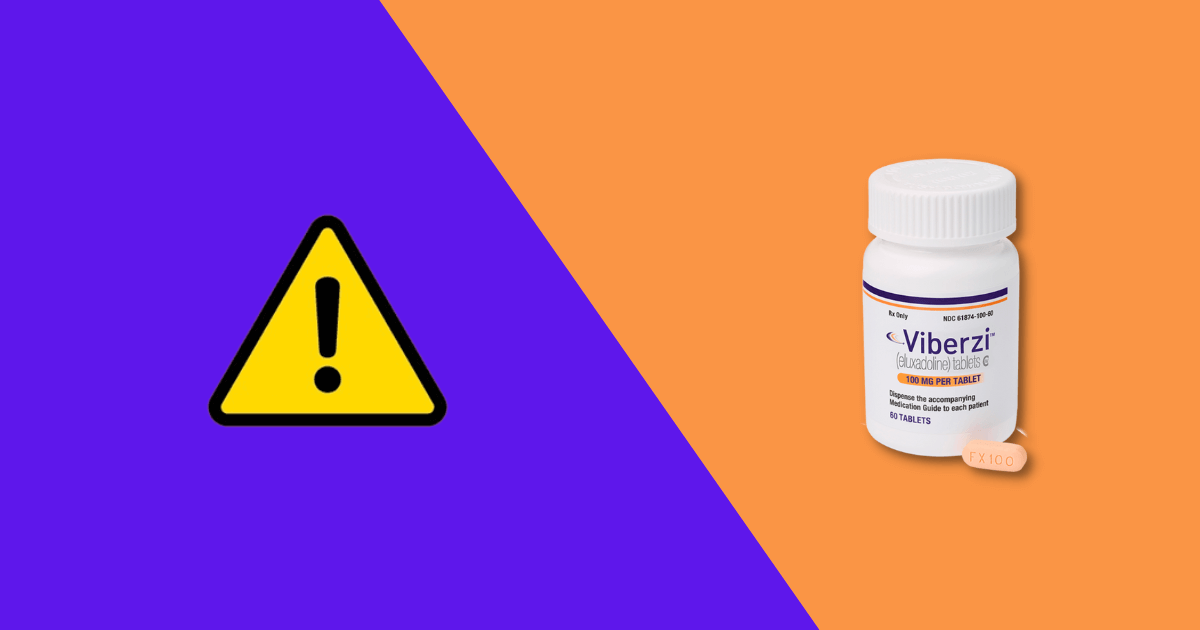Viberzi side effects and how to avoid them
Table of contents
Viberzi is an FDA (Food and Drug Administration) approved medication manufactured by Allergan USA. It is classified as a mu-opioid receptor agonist and is used to treat irritable bowel syndrome where the main symptom is diarrhea (IBS-D). While Viberzi is generally well tolerated, there are some potential side effects that people should be aware of. The most common side effects of Viberzi include constipation and stomach pain. Less common but more serious side effects can include pancreatitis.
Learn more about the side effects of Viberzi and what you can do to avoid them.
What is Viberzi (eluxadoline)?
Viberzi is a mu and kappa opioid receptor agonist and a delta opioid receptor antagonist. When Viberzi acts on opioid receptors in the stomach and intestines, secretions from the stomach and pancreas are reduced. This slows down the movement of food and delays digestion. Activity at multiple opioid receptors treats the symptoms of IBS-D while reducing the likelihood of constipation.
How long does Viberzi stay in your system?
Viberzi has a half-life of around 4 to 6 hours, so it will stay in your bloodstream for 30 hours after your last dose.
Is Viberzi a narcotic?
No, Viberzi is not a narcotic. It does work on some of the same receptors as opioid pain medications, but it has a lower risk of abuse and dependence. Viberzi is a Schedule IV controlled substance that does carry the risk of dependence. But according to its manufacturer, Viberzi was designed to have a low risk for abuse and a low potential for dependence.
What should you not do with Viberzi?
Do not take medications that may cause constipation, such as Lotronex (alosetron), loperamide, anticholinergic medicines, or opioid pain medications, as these will increase the risk of side effects such as constipation and abdominal pain.
Can you take Viberzi long-term?
Viberzi may be taken for as long as your doctor recommends it to be taken. Symptoms of IBS-D may return if you discontinue treatment with Viberzi.
How long does Viberzi take to work?
Benefits of using Viberzi will be seen within the first week of treatment, with maximum benefits seen at 6 weeks.
Is Viberzi a stimulant?
Viberzi is not a stimulant. It belongs to a class of drugs known as mu-opioid receptor agonists.
What are the most common side effects of Viberzi?
The most common side effects of Viberzi in clinical trials include:
- Constipation
- Stomach pain
- Nausea
- Common cold symptoms
- Bloating
- Dizziness
- Vomiting
- Gas
- Rash
Viberzi can cause serious side effects, including:
- Life-threatening allergic reactions, including hives and trouble breathing
- Pancreatitis
- Severe constipation
- Liver impairment
If you experience any of these serious side effects, stop taking Viberzi and seek medical attention immediately. You are recommended to report any side effects of prescription medications to the U.S. Food and Drug Administration (FDA). Go to www.fda.gov/medwatch, or call 1-800-FDA-1088.
Does Viberzi cause weight gain?
There is no change in weight that is associated with taking Viberzi. If you experience an unexplained change in your weight, notify your doctor.
Viberzi dosage
Viberzi is available as 75mg and 100 mg tablets. Take Viberzi exactly as your healthcare provider prescribes it to you twice daily with food. If you think you have taken too much Viberzi, call your healthcare provider or go to the nearest hospital emergency room right away. Store Viberzi at room temperature between 59°F to 86°F (15°C to 30°C).
You are advised to read the complete prescribing information, medication guide, and drug information, and always speak with your healthcare provider for medical advice about any changes to your dose so they can monitor and evaluate your condition.
What should you do if you miss a dose of Viberzi?
If you forget to take a dose of Viberzi, take your next dose at your usual time. Do not take extra doses of Viberzi to make up for missed doses.
Viberzi drug interactions
When Viberzi is taken with other drugs, it may change how they work or increase the frequency and severity of side effects. Make sure your doctor is aware of all prescription drugs, over-the-counter medications, vitamins, and herbal supplements you take, including:
- Cyclosporine
- Gemfibrozil
- Rifampin
- Eltrombopag
- Rosuvastatin
Viberzi warnings & precautions
Don’t take Viberzi if you:
- Have a known hypersensitivity to eluxadoline or any other ingredients in Viberzi
- Don’t have a gallbladder or have a current or past blockage in their gallbladder
- Have sphincter of Oddi disease or dysfunction
- Have a history of alcohol addiction, alcohol abuse or drink more than 3 alcoholic beverages a day
- Have inflammation of the pancreas (pancreatitis) or a blockage
- Have severe liver impairment
- Have chronic or severe constipation
Talk to your doctor before taking Viberzi if you:
- Have new or worsening abdominal pain, nausea, or vomiting – Viberzi causes an increased risk of pancreatitis and sphincter of Oddi spasm
- Have previously had serious allergic reactions, including anaphylaxis when taking Viberzi
- Have liver problems
- Are currently pregnant, or are planning on becoming pregnant
- Are breastfeeding or are planning to breastfeed
You should always check with your doctor or pharmacist before taking any medication, including Viberzi, to make sure it is safe for you.
How to avoid Viberzi side effects
The best way to avoid side effects is to take Viberzi as directed by your doctor. Follow your doctor’s instructions carefully, and do not take more or less than prescribed.
If you experience any side effects, talk to your healthcare provider. They may be able to recommend ways to help reduce or prevent some of the side effects.
1. Stick to the recommended dosage
Take your prescribed dose of Viberzi that has been recommended by your healthcare professional. Do not take more or less than prescribed.
2. Monitor your blood sugar levels
If you have diabetes, it is important to monitor your blood sugar levels closely while taking Viberzi. Check your blood sugar levels as directed by your doctor and report any changes to your doctor immediately.
3. Drink plenty of fluids
Drink eight to 10 glasses of water or fluids every day to help prevent dehydration, which can make side effects worse.
4. Avoid alcohol
Avoid drinking alcohol while taking Viberzi as it can increase your risk of pancreatitis (inflammation of the pancreas)
5. Don’t skip meals
Eating regular meals and snacks will help to prevent low blood sugar levels (hypoglycemia).
6. Check your feet
If you have diabetes, check your feet regularly for any cuts, sores, or redness. Tell your doctor if you experience any problems with your feet while taking Viberzi.
7. Know the signs and symptoms of Viberzi side effects
Signs and symptoms of side effects include constipation and stomach pain. If you experience any of these symptoms, speak to your doctor for medical advice.
8. Monitor your weight
Viberzi should not cause weight gain or weight loss. If you experience any changes in weight while taking Viberzi, get medical advice from your doctor.
9. Tell your doctor about all medications you’re taking
Be sure to tell your doctor about all other medications you’re taking, including over-the-counter drugs, vitamins, and herbal supplements, as they can interact with Viberzi.
10. Get regular medical check ups
It is important to get regular medical check ups and monitor your medical conditions. Your doctor will monitor your side effects and may adjust your dose of Viberzi as needed.



